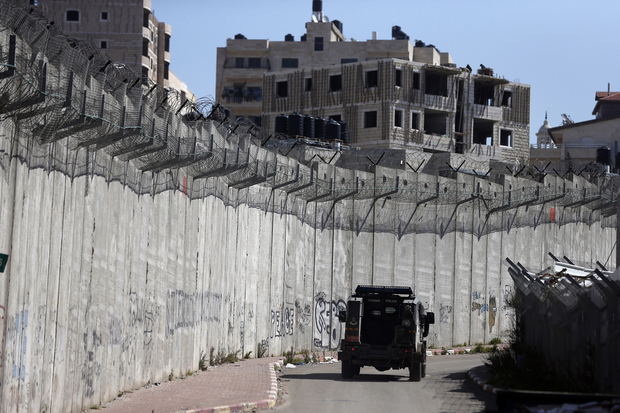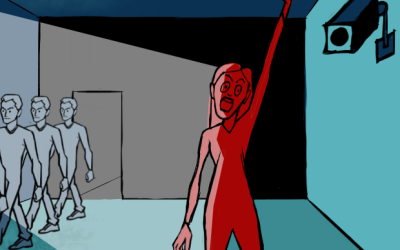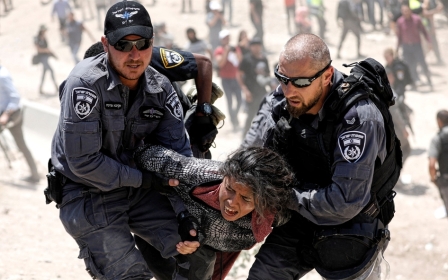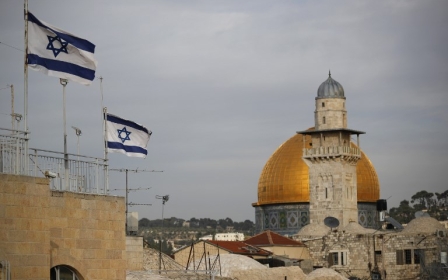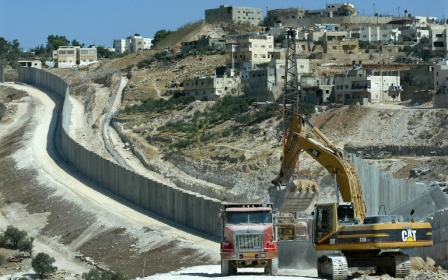Israeli elections: Creating a front against apartheid
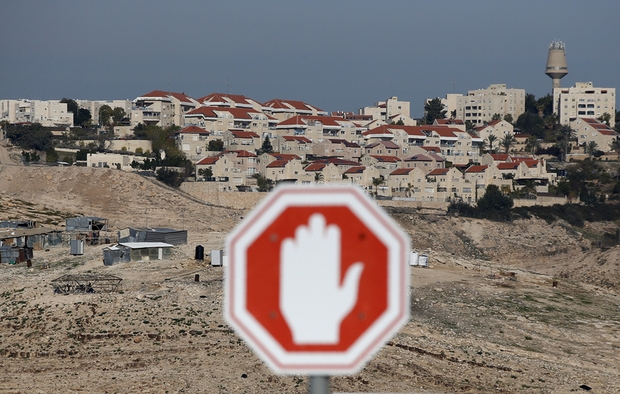
The Israeli election campaign, in full force less than two weeks before the vote, has oscillated between discussions of corruption and terrorism.
Critically, however, the election campaign appears to be shunning, at all costs, the central topic that will determine Israel’s future: the apartheid system gradually shaping Jewish-Palestinian relations.
Those who made peace their agenda – such as former foreign minister Tzipi Livni – have fallen by the wayside. Even US President Donald Trump’s recent intervention, recognising Israel’s claim to sovereignty in the Golan Heights, has ignited debate mainly over the future of the northern front, rather than over the likely future annexation of Palestinian lands.
The silencing on this topic only makes its long-term impact more severe, like an untreated disease. The democratic camp must create a local and international front against apartheid to save the country from this bleak future, led by Prime Minister Benjamin Netanyahu and his allies.
Geographic blindness
Long years of incitement against the very idea of peace and Palestinian statehood - against human rights organisations and “the left” in general - are having an effect. Many progressive Israelis having been raising new (and important) flags, such as women’s rights and gay rights, environmental protection and social justice. Resistance to Israel’s oppression of Palestinians can, it seems, wait for another day. But this is a dangerous illusion.
This overlooking produces geographic blindness, unmatched in any other election campaign globally. On the one hand, millions of Palestinians controlled by Israel are not counted as voters and have no say in determining the government that will shape their lives. On the other, hundreds of thousands of Jewish settlers - who reside in the same areas - are considered fully fledged citizens, and are likely to determine who forms the next government.
Despite the charade of a Palestinian 'self-rule' in small enclaves ... recent Israeli interventions have exposed the real masters of Palestine
It is important to remember that the Palestinian territories and their five million Palestinian inhabitants are going nowhere. Israel settles these territories in a continuing colonial project, ruling Palestinians with a violent iron fist. Despite the charade of Palestinian “self-rule” in small enclaves, known as Areas A and B, recent Israeli interventions have exposed the real masters of Palestine.
These have included the stopping of tax transfers to the Palestinian Authority, constant invasions of the Israeli army into Palestinian “self-ruled” areas and frequent killings, the Israeli transfer and distribution of Qatari cash to Gaza, and the bombing at will of dozens of Palestinian targets after rocket attacks.
Creeping apartheid
Israel controls the area between Jordan and the Mediterranean Sea in a near-total manner. But the geographic blindness through which Israeli electoral politics “see” Jews but not Palestinians points to a deeper transformation, best described as creeping apartheid.
Under this decades-long system, several broad types of citizenships have been created and institutionalised as “separate and unequal”. Jews possess full citizenship anywhere on the land, while Palestinians are fragmented into inferior legal categories: second-class Israeli citizens, “residents” of East Jerusalem, “subjects” of the West Bank and Gaza, or refugees in the camps.
The parallels to apartheid South Africa are clear: Jews are akin to “the whites”, Palestinians in Israel are the “coloureds”, and their brethren in the West Bank and Gaza are “the blacks”.
Geographically, the hundreds of settlements in the West Bank have been connected to the rest of Israel, while Palestinians are locked into their enclaves, which resemble Bantustans, on both sides of the Green Line.
This has transformed the military - and putatively “external” and “temporary” - occupation into an internal, civil and permanent rule. This was recently codified through the nation-state law, which declares Israel to be the homeland of the Jews, where only they enjoy the right to self-determination, and which promotes Jewish settlement of the entire area.
Israel’s economic policies - which channel the vast majority of resources to Jews, while Judaising land and stifling Palestinian development - are another plank in the “separate and unequal” structure. Palestinians have contributed to the deadlock through years of terrorism, but the power to change direction remains firmly in their hands.
Distorted definitions
This requires the redrawing of political definitions and struggles. The language of “right versus left” is distorted, painting Israel as a normal state with a conservative nationalist camp, competing against a more progressive liberal camp. In such “normal” states, the right-left struggle is contained within clear demographic and political boundaries. No camp demands to rupture those boundaries, annex new territories or subject millions to colonial rule against their will.
Yet in Israel’s forthcoming election, this is precisely the agenda of all parties associated with Likud circles and beyond, including all the Jewish religious parties, amounting to more than half the parliament (but representing perhaps a quarter of the people under Israeli rule).
These politicians object to the establishment of a Palestinian state and support continuing Israeli control over the entire land, against international law and the will of the Palestinians.
This was made even more blatant by the inclusion of the racist Otzma Yehudit (Jewish Power) party in the “legitimate” conservative camp, after decades in which all Jewish parties rejected such a partnership.
The masks have thus been taken off – this is a colonial project against Palestinian rights and those supporting the Palestinian struggle, and the main tool is the emerging apartheid state.
The struggle against this agenda begins by naming it correctly. This is not a “right-wing agenda”, but an emerging apartheid bloc. This is not a mere struggle between two national movements; it is colonialism. It is likely that after the election, the apartheid reality will deepen, creating greater geographic, legal and economic barriers to equality and democracy.
The new political map of the Palestinian territories will likely look increasingly like the black Bantustans in pre-1994 South Africa, with the expected support of the US regime and the silent compliance of Russia, India and even Europe.
International coalitions
What should the democratic and progressive forces do? First, in the short time before the elections, the obvious apartheid reality should be flagged everywhere. All who believe in democracy must create a joint front against apartheid.
This is a common denominator that can unite forces, from the moderate right to Arab parties, despite large differences on other topics. Calling for a front against apartheid will put the topic in the public spotlight, cracking the current geographic and political blindness.
The old tropes of “democracy here and occupation there” or “left versus right” are dead. The Bar-Ilan speech in which Netanyahu discussed a two-state solution a decade ago, is dead. A new discourse that reflects the true political agenda and the reality on the ground is urgently needed to energise democratic forces, both in Israel/Palestine and overseas.
The new political map of the Palestinian territories will likely look increasingly like the black Bantustans in pre-1994 South Africa
This is particularly relevant to Jewish communities around the world that are often at the forefront of the fight for democracy and human rights, but that usually remain silent on Israeli crimes. It is equally important for supporters of the Palestinian struggle for justice to face the new reality.
Public discourses do not change overnight. The front against apartheid will have to work after the elections and gather every possible ounce of support to combat the dangers ahead. It will have to create Jewish-Palestinian and international coalitions, mobilise international law, command media attention and occupy the streets.
The solutions to the current apartheid scenario may vary. Similar protracted conflicts in Northern Ireland, Bosnia, Macedonia, Colombia and South Africa have displayed a range of solutions: partition, confederation, federation, or a united binational or liberal democratic state.
All are possible in Israel-Palestine, although confederation appears most likely. But first, the front against apartheid must be established to halt the deterioration – the sooner the better.
The views expressed in this article belong to the author and do not necessarily reflect the editorial policy of Middle East Eye.
Middle East Eye propose une couverture et une analyse indépendantes et incomparables du Moyen-Orient, de l’Afrique du Nord et d’autres régions du monde. Pour en savoir plus sur la reprise de ce contenu et les frais qui s’appliquent, veuillez remplir ce formulaire [en anglais]. Pour en savoir plus sur MEE, cliquez ici [en anglais].



